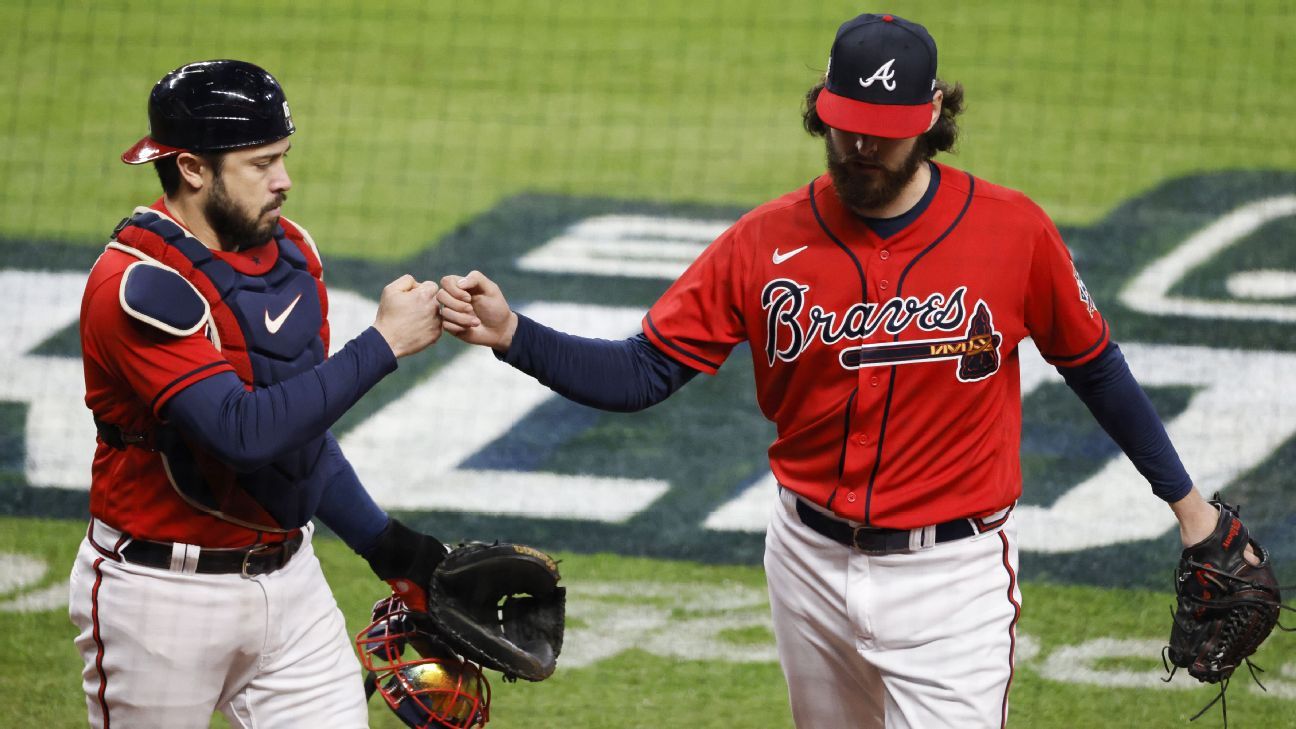
ATLANTA -- Here it comes, the ultimate analytics move, another egregious attack on the heart of the game. After five no-hit innings in Game 3 of the World Series, manager Brian Snitker walked toward Ian Anderson in the Braves' dugout and informed his starting pitcher that he was taking him out before he could face the top of the Houston Astros' order for the third time. Gather 'round, all you nerd-haters -- this one was shaping up to be a classic of the genre.
Except the man who made the decision said it was nearly the exact opposite. Snitker, showing he has zero interest in the human condition's bottomless desire for drama, trampled on the storyline not because of a spreadsheet but because of a very human feeling in the pit of his stomach. Anderson would not get his no-hitter, and the world would not get its preferred storyline, and there was a simple reason for that: It just didn't feel right.
"Ian was like, 'Are you sure? Are you sure?'" Snitker says. "But I was just like, 'Ian, I'm going with my gut right here. Just my eyes, my gut.' It would have been real easy to let him go back out."
Snitker is disarmingly folksy -- Nobel-level folksy -- and it can serve to take the sting away from his bluntless. "The no-hitter thing," he said, tossing it out there like he'd just remembered. "He wasn't going to pitch a nine-inning no-hitter."
Snitker talked a little bit more, sounding like someone who was still trying to convince himself, before finally saying, "I don't know. It could have backfired, I guess. I just thought at that point in time, in a game of this magnitude, that he had done his job."
In the dugout, Anderson, a 23-year-old with an impenetrable demeanor and a short history of phenomenal postseason pitching, could feel Snitker making his way toward him. And he knew why, too, because Snitker makes that trip only when it's accompanied by a handshake and a compliment.
"He walked down and said, 'That's it. Heck of a job,'" Anderson said. "You feel a little bit of, I had more to give, but it's something that you understand and move forward."
Anderson stared into Snitker's round face, that face that has given nearly 50 years to Atlanta Braves baseball, and he pleaded his case without a lot of conviction. "I knew he wasn't going to budge," he said. "We're very fortunate to have him, and the way he treats us is phenomenal. He'll shake your hand after every outing, good or bad, and that goes a long way."
The Braves won 2-0 to take a two games to one lead over the Astros, and if that outcome had been different, the questioning -- and the answers -- would have had a different tone. The no-hitter was lost in the top of the eighth, when -- facing Tyler Matzek -- pinch-hitter Aledmys Diaz hit a fly ball to short left field that fell at the feet of Eddie Rosario.
And so ended what would have been one of the game's least ostentatious -- almost polite -- no-hitters ever. There weren't any memorable defensive plays. Anderson was really, really good, but he put together five of the messiest no-hit innings you could imagine. He walked three, hit one, went to a full count to five hitters in five innings, and, on a cold and rainy night, nearly as many of his 76 pitches were balls as strikes. He had gone to full counts twice to Jose Altuve, who was leading off the sixth, and twice to Alex Bregman, who was up third.
It didn't feel in any way momentous until Snitker decided to end it. Anderson seemed fine with it at the time, laughing with Snitker in the dugout after the handshake. Asked to describe the expectant air that undoubtedly permeated the Braves' bullpen as they prepared to finish the job, Matzek said, "Well, Luke Jackson didn't know. [A.J.] Minter didn't know. After I got done with my inning, they came up to me and said, 'Hey, did you know you gave up the first hit?' Yeah, I did know."
Anderson admitted there was a part of him that wanted to see how far he could roll with a no-hitter in a World Series game. "I think I'm still processing it a little bit," he said.
"I need to win a baseball game," Snitker said. "I don't see a lot of stuff. My wife always asks me, 'Did you see that? Did you see that?' and I have to say no. You just get so locked into the game itself and you don't see things. The me of old, probably a couple of years ago, would have said, 'Why the hell am I doing this?' But you know, he wasn't going to throw a no-hitter himself."
It's the World Series, and the decisions aren't made with ratings or storylines in mind. They're business decisions, pure and simple, whether they originate in a series of formulas or the gut of a 66-year-old man.















 Phone: (800) 737. 6040
Phone: (800) 737. 6040 Fax: (800) 825 5558
Fax: (800) 825 5558 Website:
Website:  Email:
Email: 






